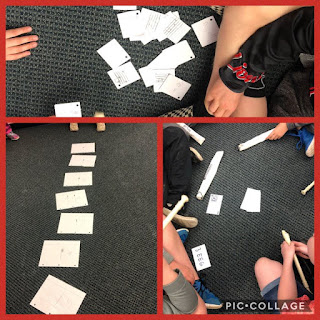Practice:
Poison Pattern - we all know this game, and recorder takes it to the next level. Students LOVE both teacher vs class (If ANYONE plays the poison pattern, the teacher gets a point and if NO ONE plays the poison pattern the class gets a point) and every person for their self (All start the game standing. If they play the poison pattern they sit and then continue to practice while sitting- last student standing wins!) Recorder wars from TPT is also a great version of this game.
Record a lesson - Any time I can use students as teachers, I love to let them get up and lead. Flipgrid has been an amazing platform to allow students to record lessons and learn from their classmates. Students are able to choose any recorder note we currently know and write a lesson to teach that note. They need to say the name of the note, show where it is on the musical staff, explain and show how to play the note on the recorder, and then use the note in a pattern or song. I love how students often add in extras and really show their personality in their lessons. In addition to having students watch each others, I also love to save some of them to show the next year.
Make a song "Look Good" and "Sound Good"- My students are social kids (which students aren't?) and really enjoy working in groups. We do a lot of pair and group practice. A few times a month, students are given 10 minutes and a current practice song and asked to make it both "look good" AND "sound good". Not every student has to play every note of the song, but they all have to play something. Students have added harmony, movement, sound effects, and more to complete their project.
Create a Recorder Station or Center - I try to do centers at least once every other week, if not once a week with my 5th grade recorder students. About half way through our unit, students have group project to create their own recorder center to practice a specific pitch set. Some students just adapt a game we have already played, but many take it even further to develop their own game. We have had a recorder duck pond, relay races, board games, spinners, beach balls, and so many more awesome ideas. After the centers are created, we have a week where we just play each others games! I often steal their ideas to use the following year in my typical stations rotation.
 |
| Hard at work creating our own recorder centers |
Improvise and Compose:
Circle Echo - Students improvise a pattern and the class echos. We do it both facing in the circle, so you can see who is playing/ the fingerings AND facing out so it is more anonymous and students have to use their EARS to echo. We do this at least once a week, and it is amazing how much more confident students get both in creating and echoing patterns the more we practice.
Partner Patterns - Students get with a partner and create a 3-8 note pattern that they both love. After we play the patterns for each other, each partner set combines with another to create and even longer melody. Students are SO creative with these! I love when the groups combine and use harmony or alter their patterns a bit to really make them fit together. It is so neat to see their songs evolve as we continue the activity. You could continue to combine groups until the whole class has written a song together!
Rock Paper Scissors Composition - Rock = B, Paper = A, Scissors = G. Students create 2 measures of 4/4 (usually) using familiar rhythms. They then play rock, paper, scissors to fill in the pitches. Each note head = a game so beamed eighth notes would be 2 games of RPS. After they have written the pitch names under each note, they then transfer their songs to staff notation.
Dice Composition - This works very similar to above, but is great for when students know more than 3 notes. Students create a rhythm, then roll the dice for the pitches (1=B, 2=A, 3=G, 4=E, etc.)
After their song is created (we usually do two measures of 4/4) they can write the song in staff notation. I love to project and copy these songs to use in our warm-ups each day! They always come out so interesting!




No comments:
Post a Comment